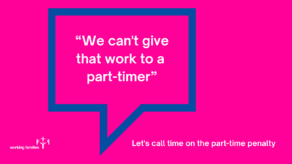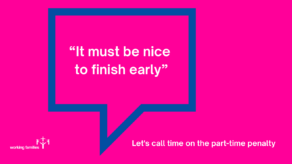“She only works part-time” – Let’s call time on the part-time penalty
Published: 8 Mar 2023

Part-time work is predominantly women’s work. It is undertaken by 38% of women, compared to 11% of men, very often so they can manage looking after their family. Working around caring commitments makes it the least flexible ‘flex’, and until the burden of care is shared more equally, women’s careers will continue to pay the price.
That’s because not all flex is created equal. Our research highlights that part-time workers report less career progression than those with location or schedule flexibility, meaning women are paying a part-time penalty. Analysis of our data by the Global Institute of Women’s Leadership found a correlation between progression and working additional hours, laying bare a culture that expects and rewards overtime, and guarantees that women part-time workers get stuck on the ladder.
We’ve shared just some of the negative comments women part-time workers told us they’d received. Despite what many think, the issue isn’t women’s commitment to their careers. Women who work part-time have just the same ambition and drive as the rest of the workforce. If we want gender equality, and to support women to have successful careers, we need to tackle head-on the stigma around part-time work as well as the treatment of part-time workers, and how part-time jobs can be designed to enable progression. Here’s how:
What can government do?
The upcoming Employment Relations (Flexible Working) Bill is a step in the right direction. The legislation will give employees the right to request flexible working arrangements from day one of their employment, and requiring consultation if a request is turned down could lead to other flexible options being explored. But legislation could go further. Making all jobs flexible by default, unless there is a valid reason not to, has the potential to transform the labour market and create a wealth of high-quality part-time roles.
What can employers do?
For employers who want to move to a fair and flexible future, there’s action they can take now. Designing and advertising all roles so they can be done flexibly with part-time or job-share options, celebrating flexible workers, promoting and developing high-performing staff who work flexibly, training line managers about the benefits of flexible working, monitoring pay and progression of flexible workers, and tracking work patterns by gender can all help to advance the careers of part-time workers.
What can women do?
Employment law can be confusing, and navigating how to exercise your rights can often feel like a challenge. Our website and helpline are available so that working parents and carers can get clued up about their rights, understand how to build a strong case for flexibility, and how to negotiate with employers for the best chance of success.
What can everyone do?
Challenging our own or other’s assumptions about part-time workers can break down the stigma that part-time working is a reflection of commitment, rather than a way to manage caring responsibilities. Trying to use positive language and exercising empathy toward colleagues or friends who work part-time can help shift attitudes and create a culture that sees part-time working as just as valid and rewarding.
 |  |
 |  |
 |  |